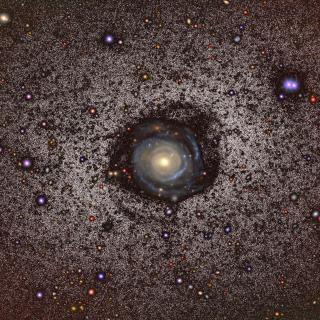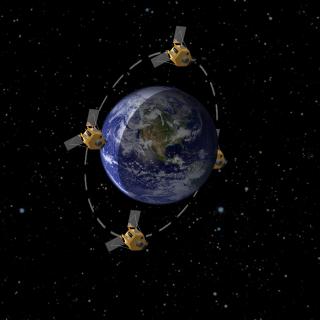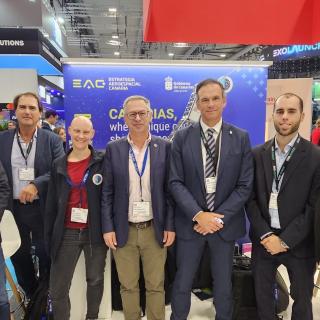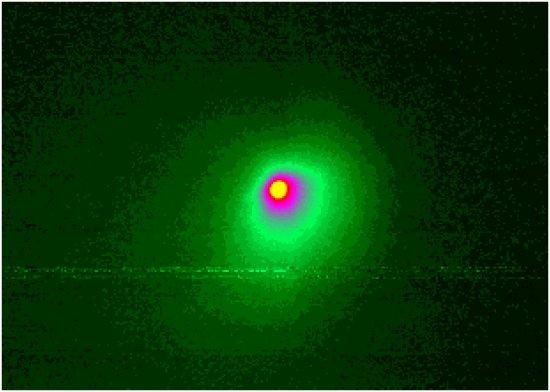It may interest you
-
 Astronomers at the Instituto de Astrofísica de Canarias (IAC), using the 2-meter robotic Two-meter Twin Telescope (TTT) at the Teide Observatory, have obtained the deepest optical images ever taken of Malin 2, one of the largest and faintest spiral galaxies in the Universe. These ultra-deep observations have revealed previously unseen structures, including several diffuse stellar emissions and a striking, elongated spiral-like feature, hinting at past interactions with other galaxies. The team has also identified a potential ultra-diffuse dwarf galaxy (UDG) about 400,000 light-years fromAdvertised on
Astronomers at the Instituto de Astrofísica de Canarias (IAC), using the 2-meter robotic Two-meter Twin Telescope (TTT) at the Teide Observatory, have obtained the deepest optical images ever taken of Malin 2, one of the largest and faintest spiral galaxies in the Universe. These ultra-deep observations have revealed previously unseen structures, including several diffuse stellar emissions and a striking, elongated spiral-like feature, hinting at past interactions with other galaxies. The team has also identified a potential ultra-diffuse dwarf galaxy (UDG) about 400,000 light-years fromAdvertised on -
 El Instituto de Astrofísica de Canarias (IAC), a través de su departamento IACTEC-Espacio, celebra hoy la System Requirements Review (SRR) de la misión IACSAT-1, un hito clave que marca la finalización de la fase B1 del proyecto y consolida todos los requisitos técnicos, científicos y programáticos necesarios para avanzar hacia el diseño preliminar del satélite. IACSAT-1 es la primera misión liderada íntegramente por el IAC dedicada a la observación astronómica desde el espacio. Se trata de un proyecto desarrollado por IACTEC-Espacio, con un equipo científico dirigido por el Prof. RafaelAdvertised on
El Instituto de Astrofísica de Canarias (IAC), a través de su departamento IACTEC-Espacio, celebra hoy la System Requirements Review (SRR) de la misión IACSAT-1, un hito clave que marca la finalización de la fase B1 del proyecto y consolida todos los requisitos técnicos, científicos y programáticos necesarios para avanzar hacia el diseño preliminar del satélite. IACSAT-1 es la primera misión liderada íntegramente por el IAC dedicada a la observación astronómica desde el espacio. Se trata de un proyecto desarrollado por IACTEC-Espacio, con un equipo científico dirigido por el Prof. RafaelAdvertised on -
 The Instituto de Astrofísica de Canarias (IAC), through IACTEC-Space, is participating this week in Space Tech Expo Europe, the largest space industry trade fair on the continent, held in Bremen from November 18 to 20. The team is located in the Spain Space pavilion, alongside the Canary Islands Aerospace Strategy (EAC), to showcase the technological developments of the CELESTE laboratories and strengthen international collaborations in the space sector. The I nstituto de Astrofísica de Canarias (IAC) is participating once again in Space Tech Expo Europe, the leading event for the spaceAdvertised on
The Instituto de Astrofísica de Canarias (IAC), through IACTEC-Space, is participating this week in Space Tech Expo Europe, the largest space industry trade fair on the continent, held in Bremen from November 18 to 20. The team is located in the Spain Space pavilion, alongside the Canary Islands Aerospace Strategy (EAC), to showcase the technological developments of the CELESTE laboratories and strengthen international collaborations in the space sector. The I nstituto de Astrofísica de Canarias (IAC) is participating once again in Space Tech Expo Europe, the leading event for the spaceAdvertised on
